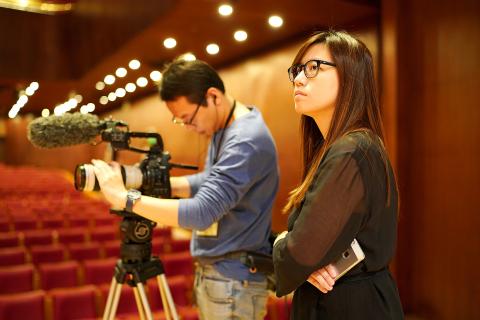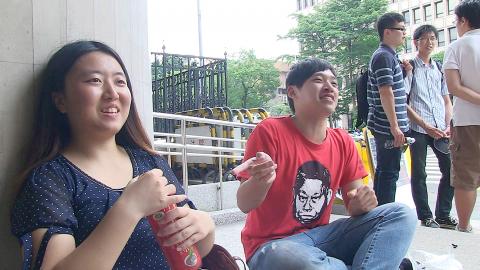We’ve heard enough about Fu Yue’s (傅榆) acceptance speech for best documentary at last November’s Golden Horse Awards, where she drew Chinese ire for stating that she hopes Taiwan can be treated as a truly independent entity. Now let’s look at the winning documentary.
On the surface, Our Youth in Taiwan follows a standard documentary format by following Chen Wei-ting (陳為廷) and Cai Boyi (蔡博藝) through a dramatic period of their lives. Chen becomes one of the leaders of the Sunflower movement and Cai, one of the first Chinese undergraduate students in Taiwan, participated in a number of social movements and wrote a popular book, I Am in Taiwan (我在臺灣,我正青春), about her experiences. The two know each other and appear at many of the same events, but they generally live out two parallel storylines. Chen openly expresses his distaste for the Chinese Communist Party (CCP), while Cai is often the only Chinese student at student protests — even those that carry anti-China connotations.
Those who follow the news will know that these two characters’ blazing youth and meteoric rise to fame (or notoriety) was cut short by controversy, more of which below, and they faded into the background, never becoming the influential powers of social change Fu envisioned when she started filming them in 2011. But it seems that Fu is affected the most by their downfalls, as she had been living vicariously through Chen and Cai, who were doing things that she did not have the drive for. As such, Fu becomes just as part of the story, her narration often revealing her insecurities, personal thoughts and hopes for social change. She may not have their moxie, but she shares their persistence and idealism. It’s a gamble for the filmmaker to insert herself too much into the film — especially in this case where she clearly admires, and even envies her subjects — but on the other hand, it’s better to just admit it and make it part of the story.

Photo courtesy of atmovies.com
Fu admits to struggling with this, as she originally believed that a good documentary should just speak through the lens. But if she decided to take the alternative route, perhaps she could have even inserted herself more as her background is also complex. Fu is a second-generation Southeast Asian Chinese who fully identifies as Taiwanese and supports Taiwanese independence despite her family’s allegiance to Chinese Nationalist Party (KMT). Surprisingly, little of this is mentioned in the film, as she plays herself off as a nobody following two rock stars around. Her background and personality could provide the third contrast between Chen and Cai, and could have sparked more insightful conversations between the three. Alas, Fu could not have known in the beginning as she didn’t decide to be part of the film until late in the editing process.
Somehow it still works, forming an interesting dynamic — the three don’t actually interact much on screen, but somehow it becomes a deeply personal account about the three of them, their youthful ambition and their changing attitudes and hopes toward realizing social change when faced with reality. This is why the film stands out from being just a recounting of a social movement — in fact, Fu missed the beginning of the March 2014 occupation of the Legislative Yuan — it’s more of a subtly emotive memoir and ode to those days of being naive and fearless.
Fu paints a well-balanced picture of Chen, not only capturing in his “heroic” moments screaming at the police or leading protests, but also filming him in his introspective private moments that reveal more about him as a complex character — especially when he ruminates on the internal conflicts that arose during the Sunflower movement, where protesters accused the leaders of not being democratic, and on his sexual harassment charges, even talking about how it felt when he committed the acts. But his story is all-too-familiar, a charismatic activist-turned-celebrity who carries a dark secret.

Photo courtesy of atmovies.com
Cai’s tale, on the other hand, is unheard of, as most Chinese students understandably would stay away from garnering too much attention in Taiwan, much less attend movements where she could be attacked just for her nationality. Her story of eventually running for Tamkang University student president and becoming a target of public wrath for just being Chinese could be a documentary on its own. Most people know Cai through her writing, and this is a chance to look at her motivations and struggles, why she would risk running afoul of Beijing to chase her Taiwan dreams, a place where she isn’t always welcome. Fu travels to China to see Cai several times, even capturing her arguing with her father, who urges her to keep a low profile and finally declares that it was a mistake to let her study in Taiwan.
Near the end of the film, Fu laments that things did not turn out as she had expected, but few documentary films go as planned anyway, and rarely do social movements fully achieve the intended results. In fact, like Fu, people tend to put too much hope in a social movement or its leaders to completely overturn things, but the realist knows that change takes decades. While Chen and Cai faded from the limelight, Fu did accompany them through their glorious run, and in fact Fu is lucky to have been able to find them before they became household names, gaining their trust early over those who became interested after the Sunflower movement.
It’s the process that matters, and Chen and Cai have made their mark in Taiwanese history. Taiwan’s civic society is still moving forward on the foundation they helped build, and meanwhile, Fu was able to save her film and win the top award. That’s not too bad for youthful ambition.

May 26 to June 1 When the Qing Dynasty first took control over many parts of Taiwan in 1684, it roughly continued the Kingdom of Tungning’s administrative borders (see below), setting up one prefecture and three counties. The actual area of control covered today’s Chiayi, Tainan and Kaohsiung. The administrative center was in Taiwan Prefecture, in today’s Tainan. But as Han settlement expanded and due to rebellions and other international incidents, the administrative units became more complex. By the time Taiwan became a province of the Qing in 1887, there were three prefectures, eleven counties, three subprefectures and one directly-administered prefecture, with

It’s an enormous dome of colorful glass, something between the Sistine Chapel and a Marc Chagall fresco. And yet, it’s just a subway station. Formosa Boulevard is the heart of Kaohsiung’s mass transit system. In metro terms, it’s modest: the only transfer station in a network with just two lines. But it’s a landmark nonetheless: a civic space that serves as much more than a point of transit. On a hot Sunday, the corridors and vast halls are filled with a market selling everything from second-hand clothes to toys and house decorations. It’s just one of the many events the station hosts,

Among Thailand’s Chinese Nationalist Party (KMT) villages, a certain rivalry exists between Arunothai, the largest of these villages, and Mae Salong, which is currently the most prosperous. Historically, the rivalry stems from a split in KMT military factions in the early 1960s, which divided command and opium territories after Chiang Kai-shek (蔣介石) cut off open support in 1961 due to international pressure (see part two, “The KMT opium lords of the Golden Triangle,” on May 20). But today this rivalry manifests as a different kind of split, with Arunothai leading a pro-China faction and Mae Salong staunchly aligned to Taiwan.

Two moves show Taichung Mayor Lu Shiow-yen (盧秀燕) is gunning for Chinese Nationalist Party (KMT) party chair and the 2028 presidential election. Technically, these are not yet “officially” official, but by the rules of Taiwan politics, she is now on the dance floor. Earlier this month Lu confirmed in an interview in Japan’s Nikkei that she was considering running for KMT chair. This is not new news, but according to reports from her camp she previously was still considering the case for and against running. By choosing a respected, international news outlet, she declared it to the world. While the outside world